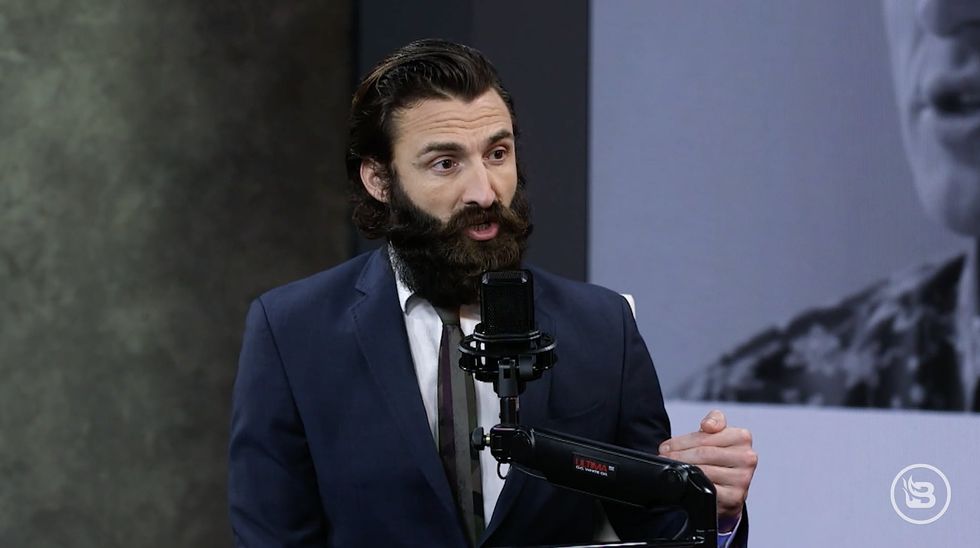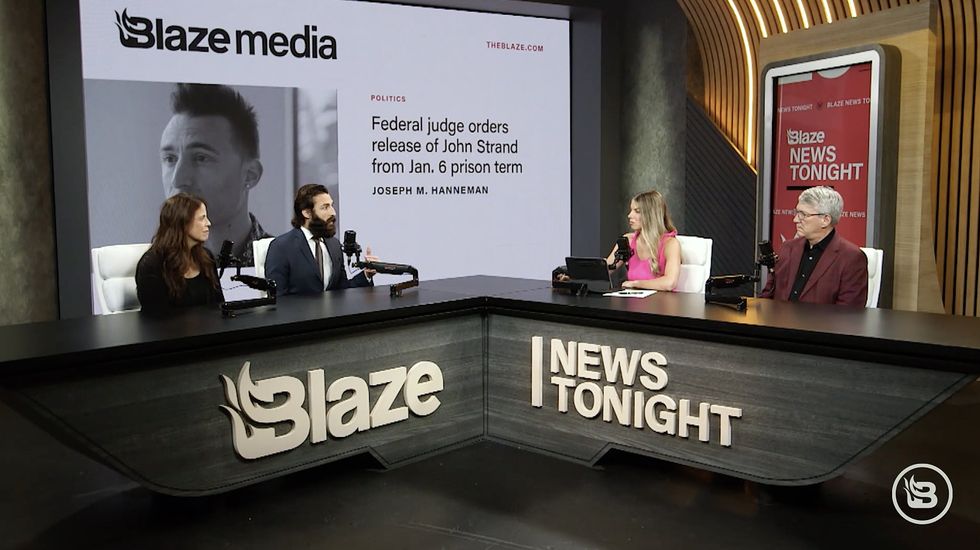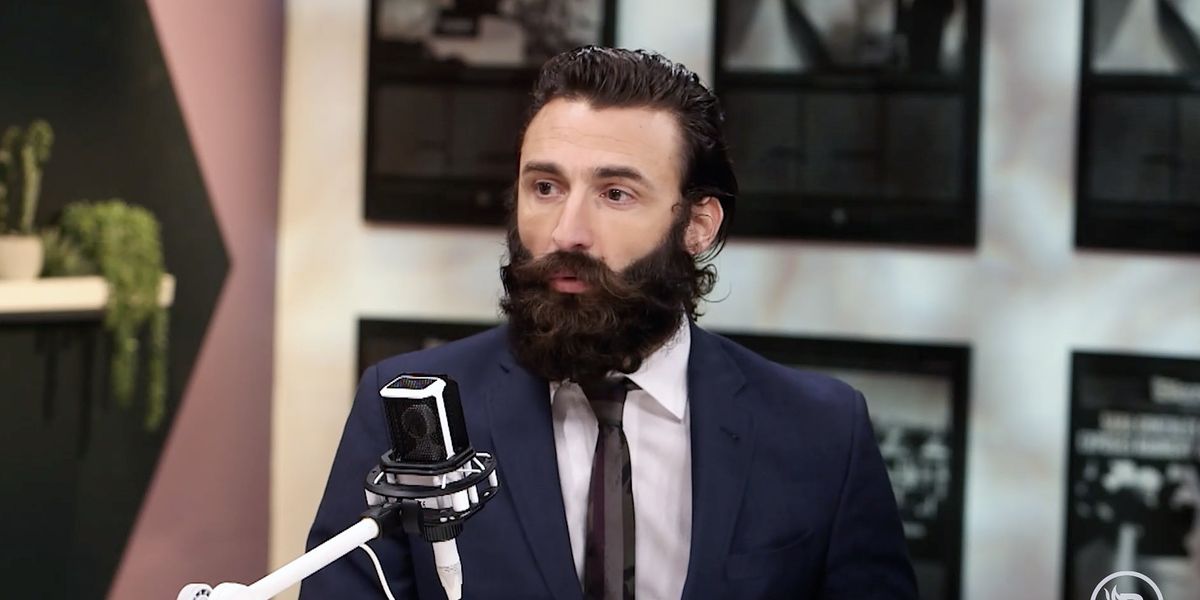“Hell on earth.”
For John Strand, those three words best describe the year in prison he served for one felony and four misdemeanor crimes at the U.S. Capitol on January 6, 2021.
Strand was freed July 24 from a federal prison in Louisiana thanks to a June 28 U.S. Supreme Court ruling that knocked out the top charge against him for allegedly obstructing Congress on Jan. 6.
He said his time in the federal Bureau of Prisons lockups in Miami, Florida, and Oakdale, Louisiana, was something “you would not wish on your worst enemy.”
FULL INTERVIEW: J6 Prisoner John Strand “This is TRUE Fascism”www.youtube.com
Strand — a self-described maverick, Hollywood actor, fashion model, musician, and author — said he felt incredible relief when he walked out the front door of the Federal Correctional Institution – Oakdale.
“I learned a lot, and God did a lot of great things,” Strand said hours later during an interview with Blaze News. “But it was terrible, so I was glad to get out of there, that’s for sure.”
Strand’s release from custody was just the latest point in a long journey that began during the COVID-19 lockdowns and led to the huge protest at the U.S. Capitol on Jan. 6 and to three and a half years of investigation, a trial, and a brutal prison experience.
His release was facilitated by the Supreme Court ruling in Fischer v. United States, in which the high court severely restricted the use of a white-collar corporate fraud statute against protesters who were at the Capitol on Jan. 6.
‘I was viciously abused in an isolation environment for about four straight months, which was essentially like being waterboarded.’
The court majority said U.S. Code 18 §1512(c)(2), which carries up to 20 years in prison, applies only if defendants “impaired the availability or integrity for use in an official proceeding of records, documents, objects or … other things used in the proceeding, or attempted to do so.”
The wording of the ruling was good news for Strand, whose Washington, D.C., trial judge had already said there was no evidence that Strand committed that type of act on Jan. 6.
On Strand’s second petition for release from prison in 2024, U.S. District Judge Christopher Cooper ordered that he be released on July 24, after serving a year in prison for his four misdemeanor convictions. Strand had already appealed his entire case to the U.S. Court of Appeals for the District of Columbia Circuit. That appeal is still pending.
Ever since the Supreme Court agreed in December 2023 to hear the challenge to how the U.S. Department of Justice had used the law against political protesters, Strand, 41, of Naples, Florida, said he’d been “watching like a hawk” for updates.
“Dr. [Simone] Gold gave me the good news,” Strand wrote to Blaze News in a July 19 message from prison. “I was tremendously grateful to God, to her, and to my other attorneys, to my indescribably amazing parents and siblings. I was filled with peace — a calm, strength, and confidence we receive from God, not without conflict and struggle, but in spite of it.”
Jan. 6 prisoner John Strand emerges from the Federal Correctional Institution – Oakdale in Louisiana on the morning of July 24, freed by a federal court order. At left is his friend Dr. Simone Gold, founder of America’s Frontline Doctors.Photo courtesy of John Strand, used with permission
“I knew that decision was coming imminently in a few days, and I would watch on the morning news. Then on June 28 they announced it, and I basically did what President Trump did. I did some pretty strong fist pumps and exultation and gratitude.”
The welcome ruling in the Fischer case, however, won’t erase the nightmarish existence Strand said he lived while in prison. Those memories are most likely permanent, including the dehumanizing four months he spent in solitary confinement. Only faith kept him going.
“I prayed a lot. I’m a man of faith, and my relationship with God is the only reason I even started on this journey, and it’s certainly what’s kept me strong through it,” Strand told “Blaze News Tonight” anchor Jill Savage.
“I didn’t feel strong in isolation. I felt like hell. I was in hell,” Strand said. “That was definitely hell on earth. It’s the closest I ever want to get to hell.”
Strand was thrown into solitary confinement twice in 2023. The second instance came after U.S. Rep. Marjorie Taylor Greene (R-Ga.) publicly spoke about his case and how she said he had been “tortured and abused” behind bars in Miami.
‘It’s not anything you would wish on your worst enemy.’
“They put me in this interrogation room and grilled me about this like I had something to do with it,” Strand said, “like a scene out of a movie, and then threw me back in, and I wasn’t seen again for three and a half months.”
During that time, Strand said he was not just prohibited most human contact but also forbidden to speak to his case attorney or to have any mail or calls from family.
Strand told Sara Gonzales, host of “Sara Gonzales Unfiltered” on BlazeTV, that the isolation was “physically miserable.”
“I was abused and — in a manner of speaking — tortured for a period of four months,” Strand said. “Blocked from access to my attorneys. Blocked from access to any information about what was going on and why it was happening to me.”
Strand said it would take several pages of his forthcoming book, “Patriot Plea,” to adequately describe the experience.
“It’s not anything you would wish on your worst enemy,” he said.
“I was in HELL” – J6 Prisoner Gives FIRST Interview Post-Releasewww.youtube.com
The isolation, considered a form of torture and condemned by international law, causes incredible mental strain, Strand said.
“The mind turning in on itself, it happens faster than you think,” he said. “Particularly when you don’t know the end date.
“So they throw you in there, and they don’t tell you really anything. A lot of times they don’t even tell you what they throw you in there for, but they definitely don’t tell you when you can expect to get out.”
“My time in prison was actually split between two facilities,” he said. “The first half in Miami, where I was viciously abused in an isolation environment for about four straight months, which was essentially like being waterboarded.”
Strand was transferred out of Miami to the prison in Oakdale, Louisiana, in early 2024. That facility was “definitely less oppressive,” he said, but it was still like “I was trying to breathe the oxygen of freedom through a straw from underneath a swamp.”

Gold, the founder of America’s Frontline Doctors who was with Strand at the Capitol on Jan. 6, said she could not believe how deeply isolated he was in the Miami prison.
“I’m an attorney. I’m a licensed member of the bar,” Gold said. “We tried many times to get in because I have a personal relationship with John. I didn’t just do it on my own behalf. We had his appellate attorney, lead appellate attorney, also requesting to get in.
“They didn’t let any attorney make a phone call or an email or letter,” she said. “It was unbelievable that you can just disappear somebody in our American system.”
‘They couldn’t wait to see another MAGA Republican lynched.’
Strand was serving as the bodyguard for Gold on Jan. 6. She was in Washington, D.C., to give a speech on medical freedom and COVID-19. That event had a Capitol Police-issued permit and was scheduled to be held on Capitol grounds. Due to the swarm of people who walked to the Capitol after then-President Donald J. Trump’s speech, the speaking event never took place.
Strand had become involved in the movement to get accurate information out into the public about COVID and emerging medical protocols that showed success against the viral disease.
“I helped to co-lead the Beverly Hills freedom rally, which started to draw thousands and thousands of people into downtown Beverly Hills in support of health and human rights,” Strand said. “We had a lot of really notable people come and speak, along with Dr. Gold being one of them. That’s how we first met.”
Strand had worked other events providing personal security for Gold, while also working his way up into a job as creative director for America’s Frontline Doctors.
“John was working for me; that’s why he was there,” said Gold, who had four speaking engagements that week. “So neither of us actually went specifically to protest the election results. We were there because there’s a large crowd to talk to.”

Security video from inside the Capitol shows Gold attempting to give a speech by bullhorn inside Statuary Hall. After police pushed the crowd out just before 3 p.m., Gold and Strand moved to the Great Rotunda. She stood on the platform of a statue of Gen. Dwight Eisenhower and gave her speech through a bullhorn.
Gold faced the same five charges as Strand: the 20-year felony for obstruction of Congress and four trespass-related misdemeanors. She opted to take a plea agreement on one misdemeanor count and was sentenced to 60 days in prison.
“A felony is a pretty scary moment,” Gold said. “But I decided to take a plea. I thought it was the most rational decision. We know that all the J6 defendants will get convicted. So I don’t regret the decision to take a single misdemeanor plea.”
Strand said he suspected from the beginning that Jan. 6 would end with his incarceration.
“I knew in January of 2021 that the endgame here was prison at least,” Strand said. “Yeah, and who knows what else. I knew that that was coming. I knew that was part of the script. And I knew that God had called me to do the right thing no matter what their scripts.
“So they tried it with me, and I just said, ‘Bring it on.'”
Strand and Gold had the same experience that many Jan. 6 defendants faced, starting with a terrifying FBI SWAT raid. It was so over the top, he said, it reflected the “legalization of American fascism.”
“We were assaulted,” Strand recalled. “We were in the living room on a conference call with several other colleagues, working on a Monday morning at around maybe 11, shortly before noon. And suddenly we heard just the most bloodcurdling screams you can imagine.

“They were screaming, ‘FBI! FBI! Open the door!'” Strand said. “We froze, thinking it’s a prank. And then within about 30 to 40 seconds, they broke the door to pieces. And then a dozen agents with assault rifles and red laser-sight dots bouncing on your chest. It basically was the scene straight out of a Jason Bourne movie.”
Gold said the SWAT raid was so surreal she had trouble believing it was really happening.
“I really thought it was a Colombian cartel coming to murder me,” she said. “That’s really what I thought. No way did I think this was real. It was so over the top. I’m a public person. You could pick up the phone, you could call me. No how, no way did we think this was real.”
Strand said he tried to enter his September 2022 trial with a sense of realism. Facing a jury pool with 95% who voted Democrat in the 2020 presidential race, it was not a promising outlook.
“They were hanging on every word,” Strand said. “They were hanging on every word. They couldn’t wait to see another MAGA Republican lynched. That was a lynching.”
Strand did not shave or get a haircut during his year behind bars. After being interviewed by three Blaze Media personalities on July 24, he was ready to dispatch the thick, wavy facial hair. He sat in the makeup room at BlazeTV and was treated to a shave by El Barber Shop in Irving, Texas.
Through more than 43 months, Strand has endured it all. His Christian faith serves as a sword and buckler as he puts on the full armor of God — as described by St. Paul in his epistle to the Ephesians.
While he is bruised from the battle, Strand is not bowed or broken. He hopes telling his story in interviews and his forthcoming book will help others and inspire change. He said he would not wish away the experience — even knowing how difficult it has been.
“I have not regretted it for a single second since it started,” he said.
Like Blaze News? Bypass the censors, sign up for our newsletters, and get stories like this direct to your inbox. Sign up here!
Read the full article here








![Furious Celebrities Rip Newsom, Bass Over LA Wildfire Response Chaos [WATCH] Furious Celebrities Rip Newsom, Bass Over LA Wildfire Response Chaos [WATCH]](https://www.lifezette.com/wp-content/uploads/2025/01/2025.01.09-05.18-lifezette-678004c9e71c5.jpg)
